Understanding the Principles of Catholic Social Thought and Community
VerifiedAdded on 2021/05/31
|6
|1546
|45
Essay
AI Summary
This essay provides an in-depth analysis of the principles of Catholic Social Thought (CST), focusing on the dignity of the human person, the common good, and the promotion of peace. It explores how these principles contribute to understanding the interdependence between the 'self' and the 'community'. The essay examines the sacredness of human life, the importance of the common good for societal prosperity, and the significance of peace, not merely as the absence of war, but as a state of harmony and justice. It references key tenets and philosophies, such as Ubuntu, to illustrate how individual actions and societal structures are interconnected. The conclusion emphasizes the mutual relationship between the individual and the community, advocating for all individuals to become agents of social unity and peace. The essay draws on various sources to support its arguments and provide a comprehensive overview of CST principles.
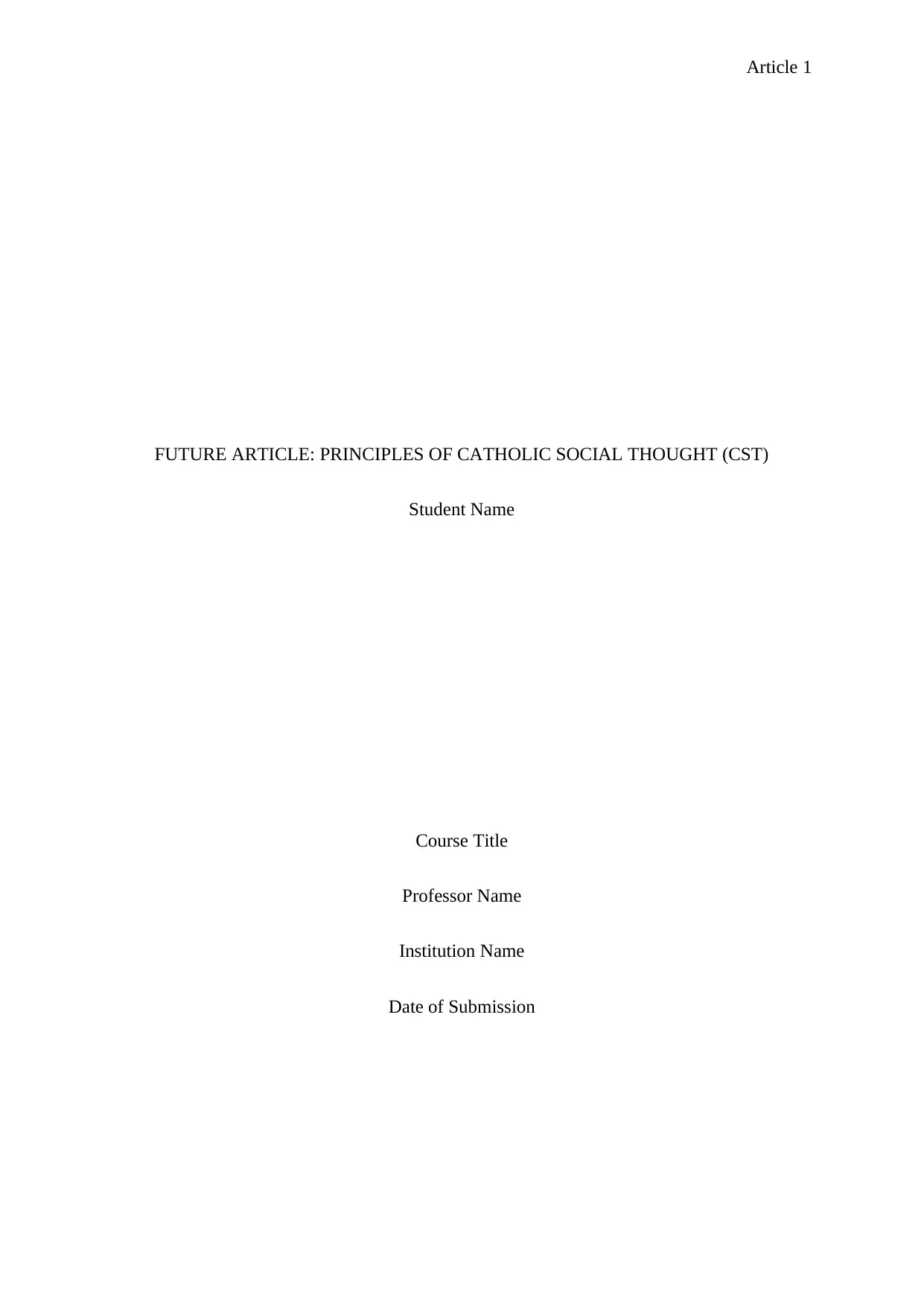
Article 1
FUTURE ARTICLE: PRINCIPLES OF CATHOLIC SOCIAL THOUGHT (CST)
Student Name
Course Title
Professor Name
Institution Name
Date of Submission
FUTURE ARTICLE: PRINCIPLES OF CATHOLIC SOCIAL THOUGHT (CST)
Student Name
Course Title
Professor Name
Institution Name
Date of Submission
Paraphrase This Document
Need a fresh take? Get an instant paraphrase of this document with our AI Paraphraser
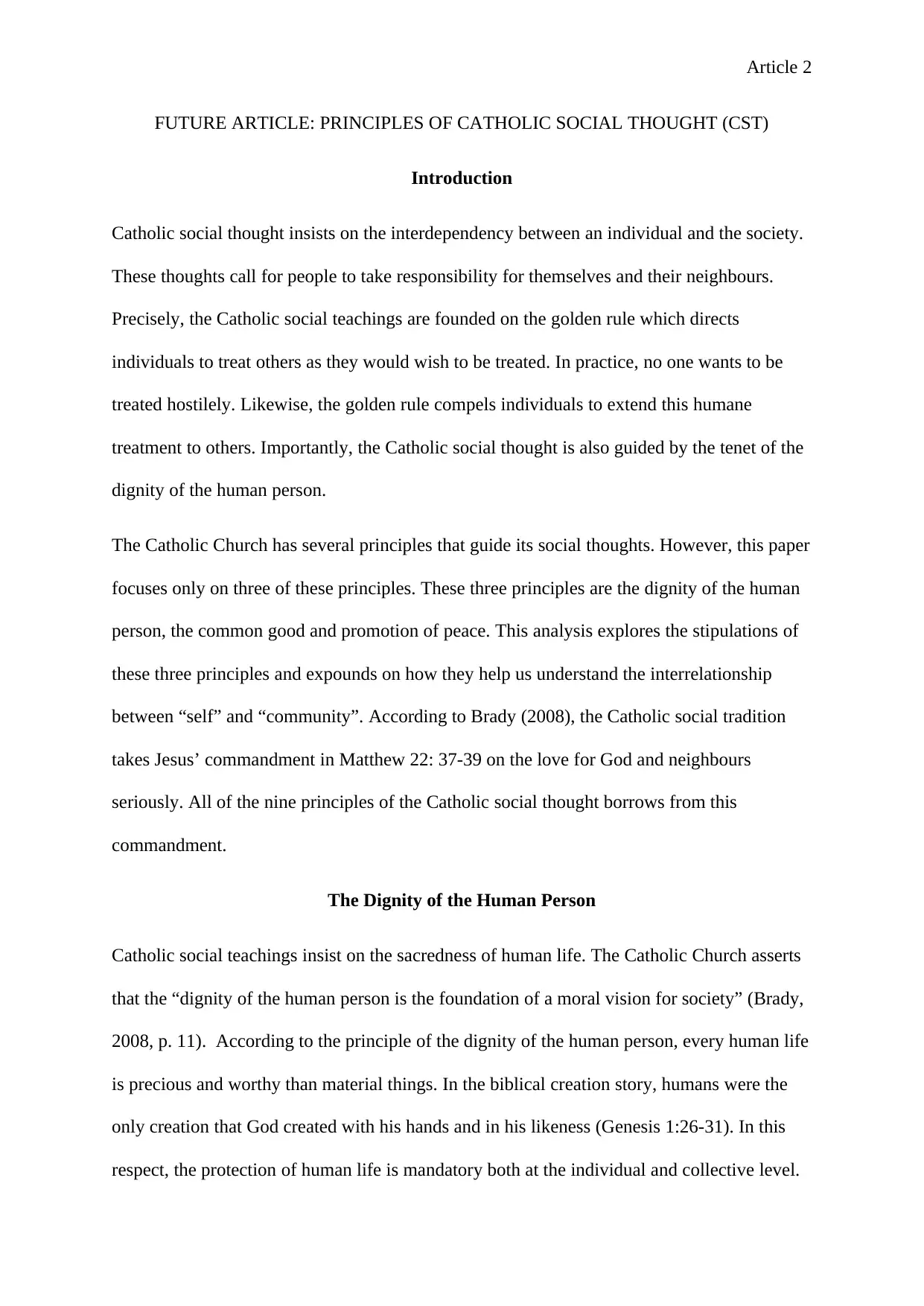
Article 2
FUTURE ARTICLE: PRINCIPLES OF CATHOLIC SOCIAL THOUGHT (CST)
Introduction
Catholic social thought insists on the interdependency between an individual and the society.
These thoughts call for people to take responsibility for themselves and their neighbours.
Precisely, the Catholic social teachings are founded on the golden rule which directs
individuals to treat others as they would wish to be treated. In practice, no one wants to be
treated hostilely. Likewise, the golden rule compels individuals to extend this humane
treatment to others. Importantly, the Catholic social thought is also guided by the tenet of the
dignity of the human person.
The Catholic Church has several principles that guide its social thoughts. However, this paper
focuses only on three of these principles. These three principles are the dignity of the human
person, the common good and promotion of peace. This analysis explores the stipulations of
these three principles and expounds on how they help us understand the interrelationship
between “self” and “community”. According to Brady (2008), the Catholic social tradition
takes Jesus’ commandment in Matthew 22: 37-39 on the love for God and neighbours
seriously. All of the nine principles of the Catholic social thought borrows from this
commandment.
The Dignity of the Human Person
Catholic social teachings insist on the sacredness of human life. The Catholic Church asserts
that the “dignity of the human person is the foundation of a moral vision for society” (Brady,
2008, p. 11). According to the principle of the dignity of the human person, every human life
is precious and worthy than material things. In the biblical creation story, humans were the
only creation that God created with his hands and in his likeness (Genesis 1:26-31). In this
respect, the protection of human life is mandatory both at the individual and collective level.
FUTURE ARTICLE: PRINCIPLES OF CATHOLIC SOCIAL THOUGHT (CST)
Introduction
Catholic social thought insists on the interdependency between an individual and the society.
These thoughts call for people to take responsibility for themselves and their neighbours.
Precisely, the Catholic social teachings are founded on the golden rule which directs
individuals to treat others as they would wish to be treated. In practice, no one wants to be
treated hostilely. Likewise, the golden rule compels individuals to extend this humane
treatment to others. Importantly, the Catholic social thought is also guided by the tenet of the
dignity of the human person.
The Catholic Church has several principles that guide its social thoughts. However, this paper
focuses only on three of these principles. These three principles are the dignity of the human
person, the common good and promotion of peace. This analysis explores the stipulations of
these three principles and expounds on how they help us understand the interrelationship
between “self” and “community”. According to Brady (2008), the Catholic social tradition
takes Jesus’ commandment in Matthew 22: 37-39 on the love for God and neighbours
seriously. All of the nine principles of the Catholic social thought borrows from this
commandment.
The Dignity of the Human Person
Catholic social teachings insist on the sacredness of human life. The Catholic Church asserts
that the “dignity of the human person is the foundation of a moral vision for society” (Brady,
2008, p. 11). According to the principle of the dignity of the human person, every human life
is precious and worthy than material things. In the biblical creation story, humans were the
only creation that God created with his hands and in his likeness (Genesis 1:26-31). In this
respect, the protection of human life is mandatory both at the individual and collective level.
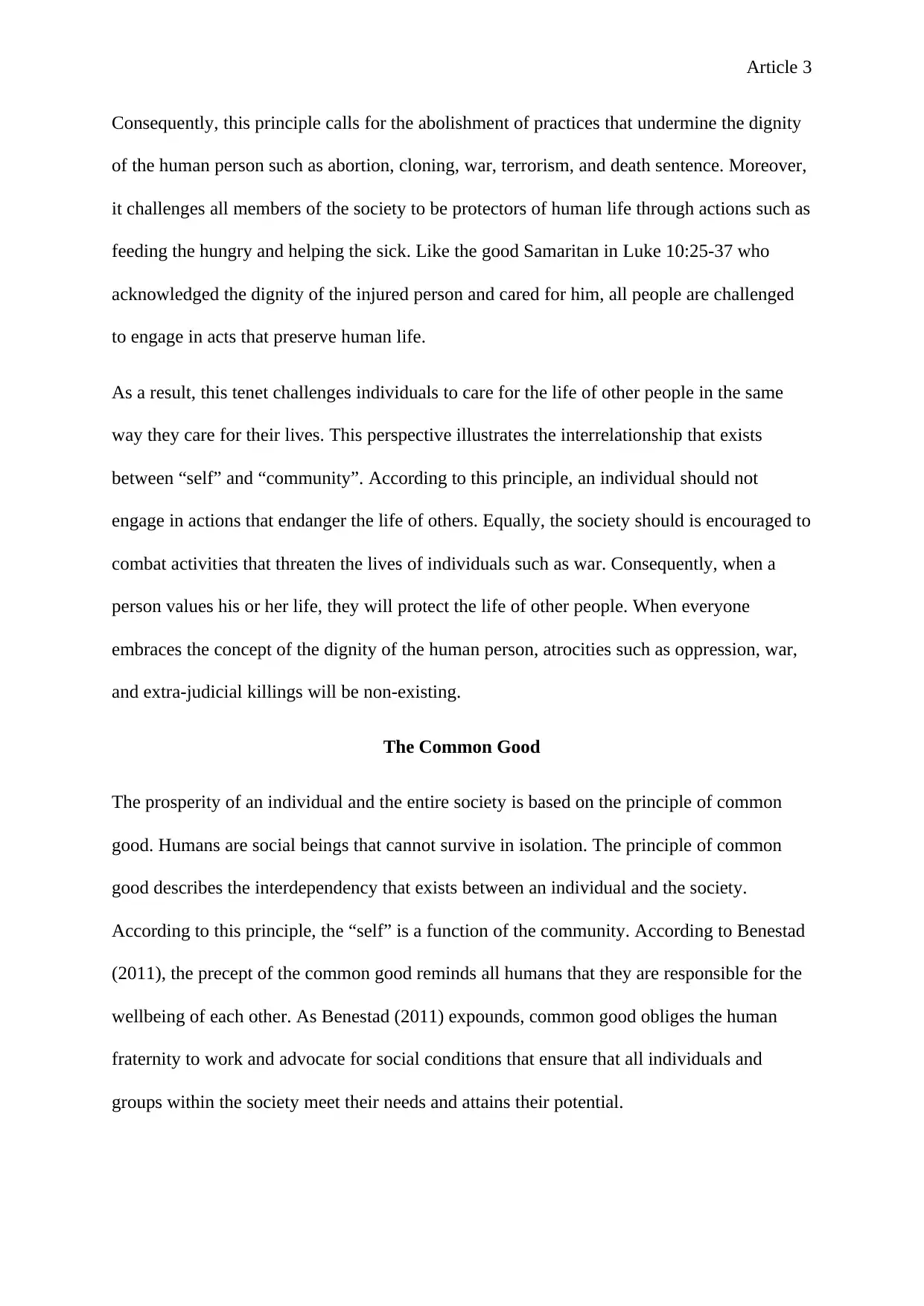
Article 3
Consequently, this principle calls for the abolishment of practices that undermine the dignity
of the human person such as abortion, cloning, war, terrorism, and death sentence. Moreover,
it challenges all members of the society to be protectors of human life through actions such as
feeding the hungry and helping the sick. Like the good Samaritan in Luke 10:25-37 who
acknowledged the dignity of the injured person and cared for him, all people are challenged
to engage in acts that preserve human life.
As a result, this tenet challenges individuals to care for the life of other people in the same
way they care for their lives. This perspective illustrates the interrelationship that exists
between “self” and “community”. According to this principle, an individual should not
engage in actions that endanger the life of others. Equally, the society should is encouraged to
combat activities that threaten the lives of individuals such as war. Consequently, when a
person values his or her life, they will protect the life of other people. When everyone
embraces the concept of the dignity of the human person, atrocities such as oppression, war,
and extra-judicial killings will be non-existing.
The Common Good
The prosperity of an individual and the entire society is based on the principle of common
good. Humans are social beings that cannot survive in isolation. The principle of common
good describes the interdependency that exists between an individual and the society.
According to this principle, the “self” is a function of the community. According to Benestad
(2011), the precept of the common good reminds all humans that they are responsible for the
wellbeing of each other. As Benestad (2011) expounds, common good obliges the human
fraternity to work and advocate for social conditions that ensure that all individuals and
groups within the society meet their needs and attains their potential.
Consequently, this principle calls for the abolishment of practices that undermine the dignity
of the human person such as abortion, cloning, war, terrorism, and death sentence. Moreover,
it challenges all members of the society to be protectors of human life through actions such as
feeding the hungry and helping the sick. Like the good Samaritan in Luke 10:25-37 who
acknowledged the dignity of the injured person and cared for him, all people are challenged
to engage in acts that preserve human life.
As a result, this tenet challenges individuals to care for the life of other people in the same
way they care for their lives. This perspective illustrates the interrelationship that exists
between “self” and “community”. According to this principle, an individual should not
engage in actions that endanger the life of others. Equally, the society should is encouraged to
combat activities that threaten the lives of individuals such as war. Consequently, when a
person values his or her life, they will protect the life of other people. When everyone
embraces the concept of the dignity of the human person, atrocities such as oppression, war,
and extra-judicial killings will be non-existing.
The Common Good
The prosperity of an individual and the entire society is based on the principle of common
good. Humans are social beings that cannot survive in isolation. The principle of common
good describes the interdependency that exists between an individual and the society.
According to this principle, the “self” is a function of the community. According to Benestad
(2011), the precept of the common good reminds all humans that they are responsible for the
wellbeing of each other. As Benestad (2011) expounds, common good obliges the human
fraternity to work and advocate for social conditions that ensure that all individuals and
groups within the society meet their needs and attains their potential.
⊘ This is a preview!⊘
Do you want full access?
Subscribe today to unlock all pages.

Trusted by 1+ million students worldwide
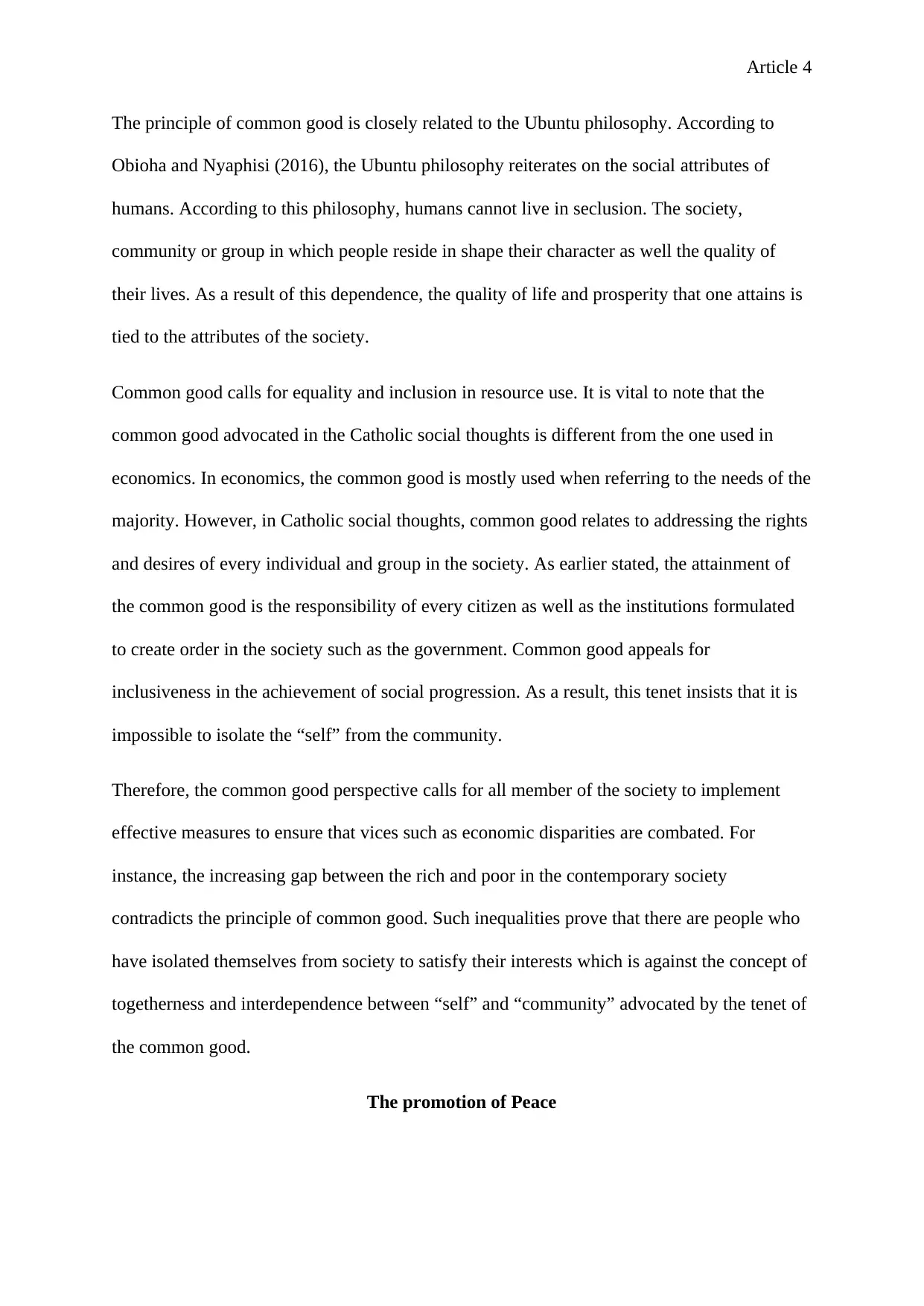
Article 4
The principle of common good is closely related to the Ubuntu philosophy. According to
Obioha and Nyaphisi (2016), the Ubuntu philosophy reiterates on the social attributes of
humans. According to this philosophy, humans cannot live in seclusion. The society,
community or group in which people reside in shape their character as well the quality of
their lives. As a result of this dependence, the quality of life and prosperity that one attains is
tied to the attributes of the society.
Common good calls for equality and inclusion in resource use. It is vital to note that the
common good advocated in the Catholic social thoughts is different from the one used in
economics. In economics, the common good is mostly used when referring to the needs of the
majority. However, in Catholic social thoughts, common good relates to addressing the rights
and desires of every individual and group in the society. As earlier stated, the attainment of
the common good is the responsibility of every citizen as well as the institutions formulated
to create order in the society such as the government. Common good appeals for
inclusiveness in the achievement of social progression. As a result, this tenet insists that it is
impossible to isolate the “self” from the community.
Therefore, the common good perspective calls for all member of the society to implement
effective measures to ensure that vices such as economic disparities are combated. For
instance, the increasing gap between the rich and poor in the contemporary society
contradicts the principle of common good. Such inequalities prove that there are people who
have isolated themselves from society to satisfy their interests which is against the concept of
togetherness and interdependence between “self” and “community” advocated by the tenet of
the common good.
The promotion of Peace
The principle of common good is closely related to the Ubuntu philosophy. According to
Obioha and Nyaphisi (2016), the Ubuntu philosophy reiterates on the social attributes of
humans. According to this philosophy, humans cannot live in seclusion. The society,
community or group in which people reside in shape their character as well the quality of
their lives. As a result of this dependence, the quality of life and prosperity that one attains is
tied to the attributes of the society.
Common good calls for equality and inclusion in resource use. It is vital to note that the
common good advocated in the Catholic social thoughts is different from the one used in
economics. In economics, the common good is mostly used when referring to the needs of the
majority. However, in Catholic social thoughts, common good relates to addressing the rights
and desires of every individual and group in the society. As earlier stated, the attainment of
the common good is the responsibility of every citizen as well as the institutions formulated
to create order in the society such as the government. Common good appeals for
inclusiveness in the achievement of social progression. As a result, this tenet insists that it is
impossible to isolate the “self” from the community.
Therefore, the common good perspective calls for all member of the society to implement
effective measures to ensure that vices such as economic disparities are combated. For
instance, the increasing gap between the rich and poor in the contemporary society
contradicts the principle of common good. Such inequalities prove that there are people who
have isolated themselves from society to satisfy their interests which is against the concept of
togetherness and interdependence between “self” and “community” advocated by the tenet of
the common good.
The promotion of Peace
Paraphrase This Document
Need a fresh take? Get an instant paraphrase of this document with our AI Paraphraser
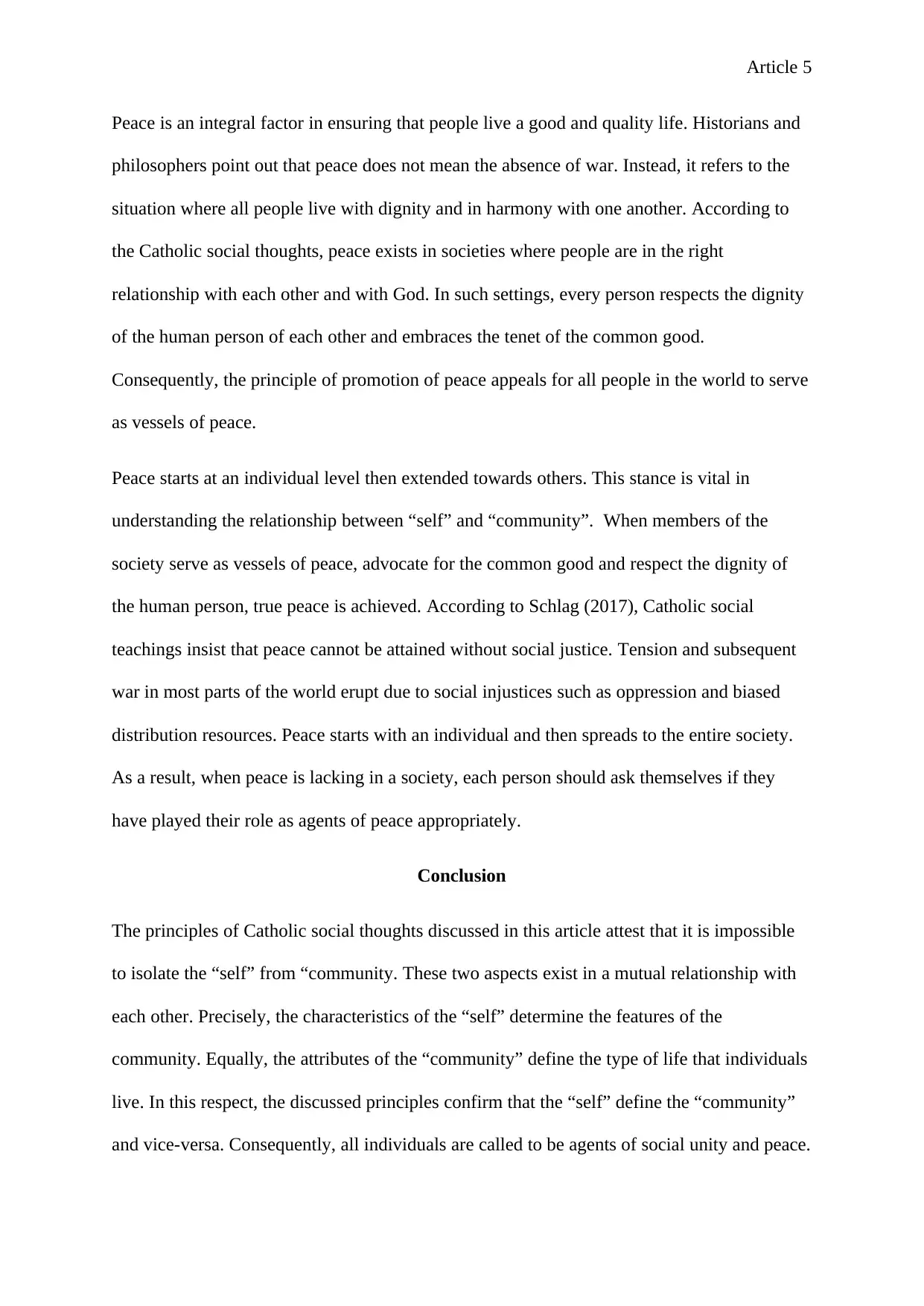
Article 5
Peace is an integral factor in ensuring that people live a good and quality life. Historians and
philosophers point out that peace does not mean the absence of war. Instead, it refers to the
situation where all people live with dignity and in harmony with one another. According to
the Catholic social thoughts, peace exists in societies where people are in the right
relationship with each other and with God. In such settings, every person respects the dignity
of the human person of each other and embraces the tenet of the common good.
Consequently, the principle of promotion of peace appeals for all people in the world to serve
as vessels of peace.
Peace starts at an individual level then extended towards others. This stance is vital in
understanding the relationship between “self” and “community”. When members of the
society serve as vessels of peace, advocate for the common good and respect the dignity of
the human person, true peace is achieved. According to Schlag (2017), Catholic social
teachings insist that peace cannot be attained without social justice. Tension and subsequent
war in most parts of the world erupt due to social injustices such as oppression and biased
distribution resources. Peace starts with an individual and then spreads to the entire society.
As a result, when peace is lacking in a society, each person should ask themselves if they
have played their role as agents of peace appropriately.
Conclusion
The principles of Catholic social thoughts discussed in this article attest that it is impossible
to isolate the “self” from “community. These two aspects exist in a mutual relationship with
each other. Precisely, the characteristics of the “self” determine the features of the
community. Equally, the attributes of the “community” define the type of life that individuals
live. In this respect, the discussed principles confirm that the “self” define the “community”
and vice-versa. Consequently, all individuals are called to be agents of social unity and peace.
Peace is an integral factor in ensuring that people live a good and quality life. Historians and
philosophers point out that peace does not mean the absence of war. Instead, it refers to the
situation where all people live with dignity and in harmony with one another. According to
the Catholic social thoughts, peace exists in societies where people are in the right
relationship with each other and with God. In such settings, every person respects the dignity
of the human person of each other and embraces the tenet of the common good.
Consequently, the principle of promotion of peace appeals for all people in the world to serve
as vessels of peace.
Peace starts at an individual level then extended towards others. This stance is vital in
understanding the relationship between “self” and “community”. When members of the
society serve as vessels of peace, advocate for the common good and respect the dignity of
the human person, true peace is achieved. According to Schlag (2017), Catholic social
teachings insist that peace cannot be attained without social justice. Tension and subsequent
war in most parts of the world erupt due to social injustices such as oppression and biased
distribution resources. Peace starts with an individual and then spreads to the entire society.
As a result, when peace is lacking in a society, each person should ask themselves if they
have played their role as agents of peace appropriately.
Conclusion
The principles of Catholic social thoughts discussed in this article attest that it is impossible
to isolate the “self” from “community. These two aspects exist in a mutual relationship with
each other. Precisely, the characteristics of the “self” determine the features of the
community. Equally, the attributes of the “community” define the type of life that individuals
live. In this respect, the discussed principles confirm that the “self” define the “community”
and vice-versa. Consequently, all individuals are called to be agents of social unity and peace.
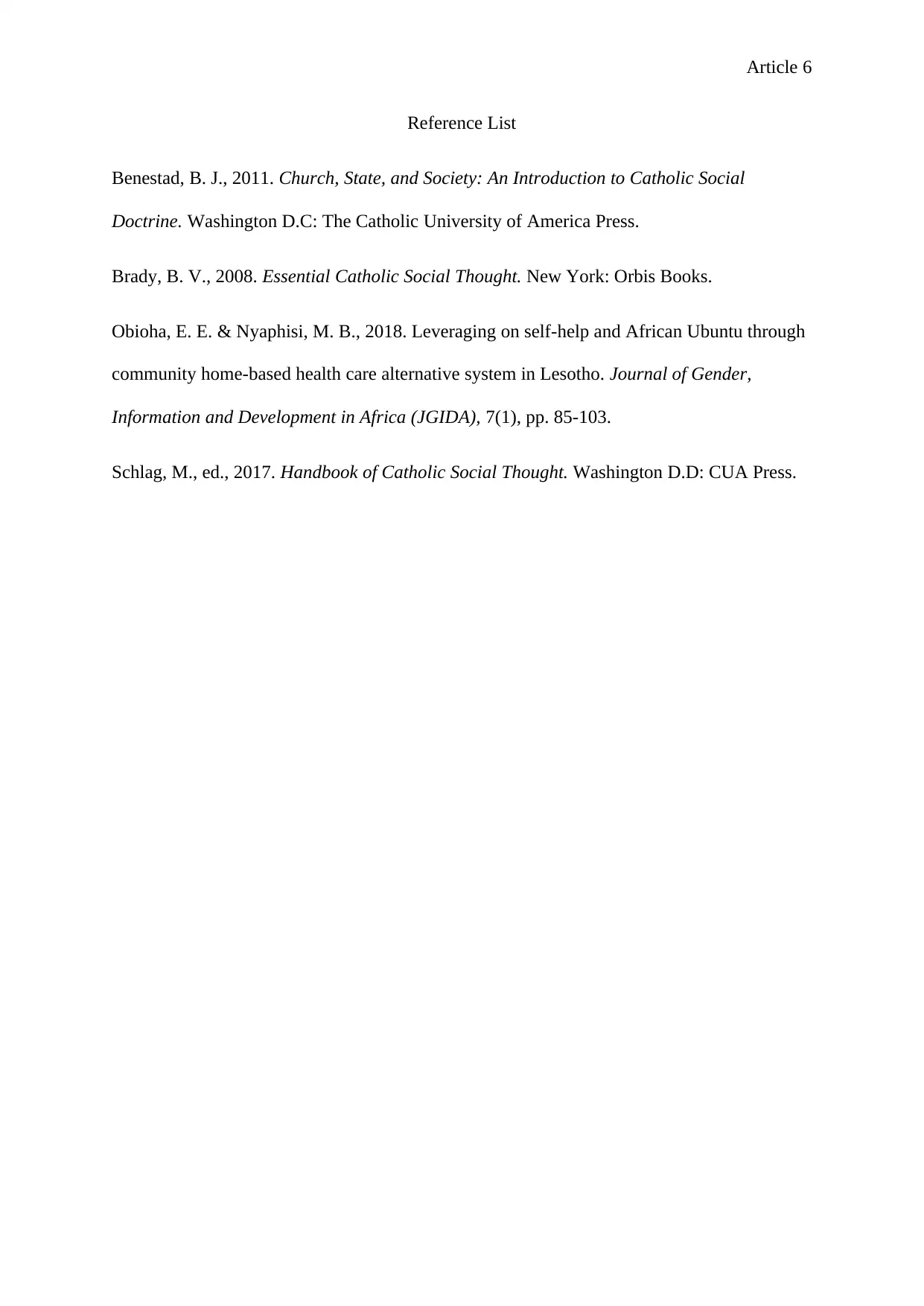
Article 6
Reference List
Benestad, B. J., 2011. Church, State, and Society: An Introduction to Catholic Social
Doctrine. Washington D.C: The Catholic University of America Press.
Brady, B. V., 2008. Essential Catholic Social Thought. New York: Orbis Books.
Obioha, E. E. & Nyaphisi, M. B., 2018. Leveraging on self-help and African Ubuntu through
community home-based health care alternative system in Lesotho. Journal of Gender,
Information and Development in Africa (JGIDA), 7(1), pp. 85-103.
Schlag, M., ed., 2017. Handbook of Catholic Social Thought. Washington D.D: CUA Press.
Reference List
Benestad, B. J., 2011. Church, State, and Society: An Introduction to Catholic Social
Doctrine. Washington D.C: The Catholic University of America Press.
Brady, B. V., 2008. Essential Catholic Social Thought. New York: Orbis Books.
Obioha, E. E. & Nyaphisi, M. B., 2018. Leveraging on self-help and African Ubuntu through
community home-based health care alternative system in Lesotho. Journal of Gender,
Information and Development in Africa (JGIDA), 7(1), pp. 85-103.
Schlag, M., ed., 2017. Handbook of Catholic Social Thought. Washington D.D: CUA Press.
⊘ This is a preview!⊘
Do you want full access?
Subscribe today to unlock all pages.

Trusted by 1+ million students worldwide
1 out of 6
Related Documents
Your All-in-One AI-Powered Toolkit for Academic Success.
+13062052269
info@desklib.com
Available 24*7 on WhatsApp / Email
![[object Object]](/_next/static/media/star-bottom.7253800d.svg)
Unlock your academic potential
Copyright © 2020–2025 A2Z Services. All Rights Reserved. Developed and managed by ZUCOL.




